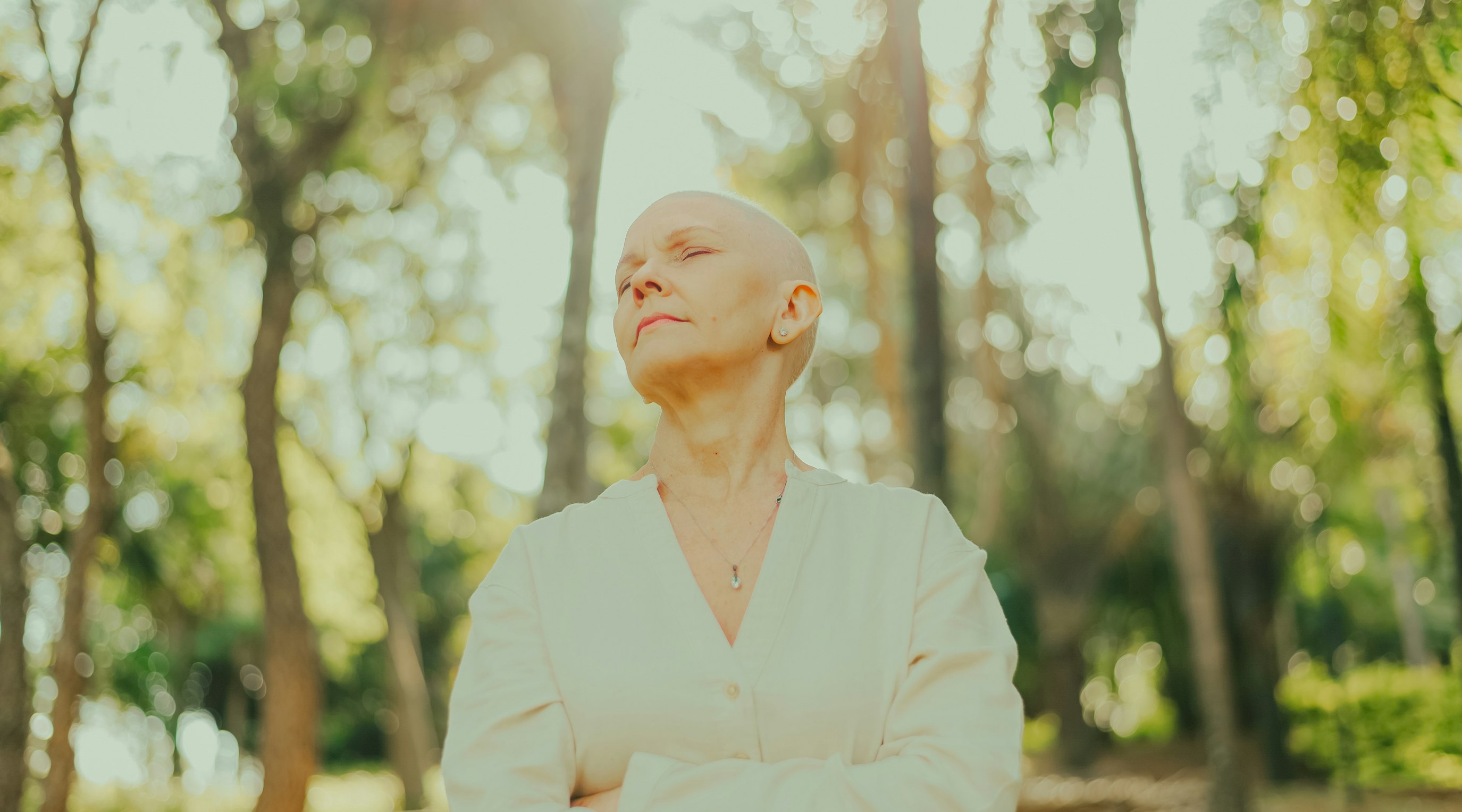Medical cannabis and cancer: an updated guide for UK patients
13 min read
Sam North
The interest in medical cannabis for cancer has grown as rapidly as the sector itself in the UK since legalisation in 2018, and with it the claims and counter-claims that surround this complex area. For people living with cancer, that noise can make it difficult to know what to trust.
So, to kicks things off, let’s make one point crystal clear.
Currently, there is zero evidence supporting the idea that cannabis can cure cancer.
What clinical studies and patient data do show is that medical cannabis for cancer can ease some of the symptoms and some of the side effects of conventional treatment, including pain, nausea, appetite loss, anxiety and sleep problems.
Researchers are also beginning to look at the possibilities surrounding cannabinoids and how they may influence tumour growth. The emerging results are interesting, but the science is still in its infancy, and nowhere near conclusive in terms of results. We will still cover that evidence here, but we are not pushing medical cannabis as a cure for cancer whatsoever.
Contents
What else does this guide cover?
- The role of medical cannabis in cancer care
- How cannabis can help ease chemotherapy side effects, along with cancer-related pain, anxiety and sleep issues
- What the most up-to-date research is showing
- The risks and side effects patients should be aware of
- How medical cannabis can be safely and legally accessed in the UK
- What real-world patient experiences and registry data are telling us
What is the role of medical cannabis in cancer care?
Cancer affects more than 3 million people in the UK today, with projections suggesting that number will rise to 5.3 million by 2040. Alongside the direct challenges of the disease, many patients experience ongoing symptoms such as pain, nausea, appetite loss (cachexia), cancer related anxiety and depression, and sleep disruption.
Medical cannabis is not a replacement for conventional cancer therapies such as surgery, chemotherapy, or radiotherapy. But the studies do show that it can act as a complementary option that helps many patients manage some of these difficult side effects.
Since the law changed in 2018, prescribing in the UK has been limited to specialists and remains tightly regulated. In practice, this means prescriptions are considered for patients who have not responded well to at least two conventional approaches.
Real-world data is encouraging. The Quebec Cannabis Registry followed more than 350 cancer patients and found that medical cannabis reduced pain scores and medication use over a nine-month period, with balanced THC:CBD strains offering the best results. Evidence from a 2021 BMJ systematic review and meta-analysis also suggests small but measurable improvements in pain and sleep quality, although the impact on anxiety and mood is less clear.
In other words, cannabis has a role, but it is supportive, not curative, and should always be overseen by a clinical team.
How does medical cannabis work in the body?
The effects of cannabis come through the body’s endocannabinoid system (ECS), a network of receptors (CB1 and CB2) and signalling molecules that helps regulate pain, appetite, mood, sleep, and immune responses.
THC for UK cancer support
THC (tetrahydrocannabinol) binds directly to CB1 receptors in the brain and nervous system.
Research shows that THC can be beneficial for a wide range of issues experienced by cancer patients, including pain relief, appetite stimulation, nausea reduction, and improvements in sleep quality, but is also what produces the “high” feeling.
These effects are dose dependent. Lower doses may ease anxiety and support relaxation, while higher doses can sometimes trigger unwanted side effects such as dizziness, confusion, or increased anxiety. With a Releaf prescription, THC is always prescribed carefully with ongoing clinical support and guidance.
CBD for UK cancer support
CBD (cannabidiol) does not cause intoxication, but that doesn't mean it can't influence how we feel both physically and mentally.
It works more indirectly by modulating serotonin receptors (5-HT1A), TRPV1 receptors involved in nausea and pain, and enzymes that break down the body’s own endocannabinoids. There is some emerging research showing that CBD does actually have a weak binding effect with both CB1 and CB2 receptors, though not in the same way as THC.
This partial interaction may help explain why CBD can take the impact of THC’s intoxicating effects without blocking its potential therapeutic benefits.
The entourage effect of cannabinoids and terpenes in medical cannabis
Beyond THC and CBD, cannabis contains more than 100 minor cannabinoids such as CBG (cannabigerol) and CBN (cannabinol), as well as aromatic compounds called terpenes (which are also showing to have an impact on the therapeutic efficacy of a particular product).
These all contribute to the entourage effect, where the combined effect of multiple cannabinoids and terpenes is often greater than the sum of their parts. For cancer patients, whole plant (other referred to as full spectrum) cannabis-based medical products are often recommended.
Does medical cannabis help with cancer pain?
Cancer pain is not one thing. It might come from a tumour pressing against a nerve, from bones weakened by disease, or from the treatments themselves such as surgery, chemotherapy, or radiotherapy. Standard options like opioids and anti-inflammatory drugs remain the frontline treatment options, but anyone who has been on these type of drugs knows their side effects can pile up quickly.
That is where medical cannabis comes in as a supporting act.
In The Quebec Cannabis Registry we mentioned earlier, more than 350 patients with cancer were tracked for nine months. Pain scores dropped dramatically within a week or so of cannabis treatment beginning using a balanced THC:CBD product (which worked better than THC alone), and opioid use came down.
The pattern holds up in larger reviews too.
A 2021 BMJ meta-analysis pulled together over 30 trials and found cannabis-based medicines nudged pain scores down and sleep quality up. The gains were modest but consistent, and that consistency can make a huge difference.
Medical cannabis for cancer pain in the UK
In the UK, medical cannabis can only be prescribed by a specialist doctor, and the NHS list is very narrow. At present, NHS prescriptions are limited to a handful of conditions such as rare epilepsies and multiple sclerosis spasticity. When it comes to cancer, NHS access only covers nausea and vomiting linked to chemotherapy. It does not extend to cancer pain.
And even then, the actual number of prescriptions the NHS has issued has been extremely limited.
Most patients who receive cannabis-based medicines do so through private clinics like Releaf, where specialists review their medical/health history, look at other treatments, and decide if cannabis may help. Prescriptions are closely monitored, with doses adjusted step by step to balance symptom relief against side effects.
There is also a distinction between licensed and unlicensed products.
Nabilone, a synthetic THC medicine, is the only licensed CBPM on the NHS for chemotherapy-induced nausea. All other cannabis oils and dried flower options (along with edibles, capsules, THC vapes, and everything in between) are prescribed privately on an unlicensed basis. In these cases, the prescriber/clinic carries responsibility for ongoing oversight and follow-up.
Can cannabis ease chemotherapy side effects?
Chemotherapy is one of the most effective cancer treatments, but its side effects can be nothing short of brutal. Nausea and vomiting affect most patients, often to the point of interfering with appetite and sleep, which leads to more complications. Conventional antiemetics are always prescribed, but they are not always enough.
This is one are where the evidence is clear on medical cannabis for cancer - for the vast majority of patients, a combo of THC and CBD will help reduce those heavy waves of nausea.
- Cannabinoids interact with serotonin (5-HT1A) and TRPV1 receptors in the gut and brain, both central to nausea signalling.
- A 2023 systematic review found that cannabinoids improved control of chemotherapy-induced nausea and vomiting when used alongside standard antiemetics.
- A 2024 randomised controlled trial reported that CBD oil reduced nausea more effectively than placebo.
- This is backed up by decades of anecdotal reporting from patients themselves.
CBD oil UK for chemotherapy nausea
The 2023 review concluded that cannabinoids add measurable benefit when used with conventional antiemetics. The 2024 trial showed that CBD oil alone reduced nausea scores compared with placebo. These results line up with smaller early-stage studies combining THC and CBD.
In the UK, CBD oil is widely available as a supplement if it contains less than 0.2% THC. Over-the-counter products vary in quality, and medical use is best managed through prescription CBD products that are subject to the same stringent level of regulation as all other medical cannabis products, all doctor-supervised.
CBD oil is not a replacement for traditional antiemetics, but the evidence suggests it can help patients stay on treatment by making chemotherapy more tolerable.
Better sleep, a larger appetite, and the potential for an improved mental health landscape all in one (but results are usually, but not always, superior with THC as part of the treatment protocol).
And on the note…
Can cannabis help with cachexia?
Cachexia is a wasting condition that undermines both strength and survival. It affects most people (estimates put the number around 82%) with advanced cancer and makes treatment so much harder to tolerate, and then bounce back from. Muscle mass declines mostly due to the fact that appetite disappears almost completely, and the body struggles to recover from each round of therapy.
This 2024 review looked at where cannabinoids can fit into cachexia care.
THC has been linked to appetite stimulation and, in some trials, modest weight gain. Patients using oils or capsules have reported a stronger drive to eat. CBD is less direct, as it does not boost hunger on its own but can ease nausea and lower stress, which can make food (or the idea of eating) more tolerable, even desirable.
Can medical cannabis reduce cancer-related anxiety and sleep issues?
A cancer diagnosis unsurprisingly comes with a whole lot of stress and anxiety, which can lead to much poorer sleep and also higher rates of depressive symptoms. Many describe lying awake with racing thoughts, or waking far too early and never settling again.
CBD has been studied for its effects on mood. It interacts with serotonin pathways in ways that can take the edge off anxious thinking. THC can do the same at low doses, although at higher levels it may worsen the problem (for some patients - other find higher levels of THC to help with anxiety. It is never a one size fits all solution with medical cannabis treatment). This is why balance and dose matter, along with ongoing clinical support.
Several trials have reported better sleep when cannabinoids are added to treatment. Patients describe falling asleep more quickly and waking less often. A recent set of clinical data in the Pharmaceutical Journal found that CBD worked as a useful adjunct during chemotherapy, improving rest and reducing reported anxiety scores.
Can cannabis suppress tumour growth?
There is growing interest in how cannabinoids may influence cancer at the cellular level, but again, this is early stage research and not to be taken as gospel anytime soon.
This 2022 review, titled “Use of Cannabis and Cannabinoids for the Treatment of Cancer,” pulled together data from laboratory and animal studies showing that cannabinoids can sometimes trigger cell death, reduce blood vessel formation, or slow the spread of tumour cells.
These findings are confined to controlled experiments.
They do not demonstrate that cannabis can shrink tumours in people. Human evidence is minimal, and no clinical trial has yet confirmed a reliable anti-cancer effect.
Despite this, claims that cannabis cures cancer circulate far too widely online. They are simply not supported by science at this point, but let see what the future holds.
Releaf’s position is clear. In the UK, medical cannabis is prescribed to ease symptoms such as pain, nausea, appetite loss, anxiety, and poor sleep. It is not prescribed as a cancer treatment and it is not a cure.
For a more in-depth look at this fascinating data, alongside other natural treatment options for tumour control/reduction, check out Decoding Cannabis: Can cannabis suppress tumour growth?
FAQs on UK medical cannabis for cancer
Can CBD help with nausea from chemotherapy?
Yes. When combined with standard antiemetics, CBD has been shown to improve control of chemotherapy-induced nausea and vomiting. This reflects the evidence already discussed in the section on chemotherapy side effects.
What CBD oil is best for cancer patients?
There is no single product that works best for everyone. Prescribed oils are selected according to individual needs and UK prescribing standards. Over-the-counter oils are not recommended for cancer treatment.
Can I use CBD alongside chemotherapy?
CBD can interact with chemotherapy drugs. It should only be used under medical supervision, as outlined earlier in the access and safety sections.
What are the long term side effects of medicinal cannabis?
The data are still developing. Some patients may face risks such as dependency or cognitive effects, but these outcomes remain under study. Safe use depends on ongoing monitoring by prescribers.
Is cancer a disability in the UK?
Yes. Under the Equality Act, cancer is automatically classed as a disability from the point of diagnosis.
Does cannabis help cancer patients sleep?
Evidence suggests that cannabinoids can improve sleep onset and quality. This was covered in the section on anxiety and sleep, where CBD in particular showed benefit as an adjunct.
Can cannabis cure cancer?
No. There is no clinical evidence that cannabis cures cancer. Laboratory findings are not enough, and cannabis is prescribed in the UK only for symptom management.
How to get medical cannabis for cancer in the UK?
Access begins with Releaf’s medical cannabis eligibility checker. It is free, quick to complete, and will show whether you may qualify for treatment. If you are found to be eligible, and are prescribed medical cannabis through Releaf, you will also get a free medical cannabis card.
If you are found to be potentially eligible, you can then book an initial consultation with our Oncology specialist, Dr Sue Clenton, who is also the Medical Director of Releaf. She will review your history, discuss your current treatment, and decide whether medical cannabis is an appropriate option.
Releaf - Let’s Rethink Healthcare
Share article
Did you like this article?
It is important to seek medical advice before starting any new treatments. The patient advisors at Releaf are available to provide expert advice and support. Alternatively, click here to book a consultation with one of our specialist doctors.
Elevate your wellness with medical cannabis
Get comprehensive care, convenience, and confidence with an all-in-one treatment plan.
Am I eligible?Authors
Sam North, a seasoned writer with over five years' experience and expertise in medicinal cannabis, brings clarity to complex concepts, focusing on education and informed use.
medically reviewed
meet our specialist
Editorial Policy
All of our articles are written by medical cannabis experts, guided by strict sourcing guidelines, and reference peer-reviewed studies and credible academic research. Our expert clinical team and compliance specialists provide valuable insights to ensure accuracy when required. Learn more in our editorial policy.
Need more help?












